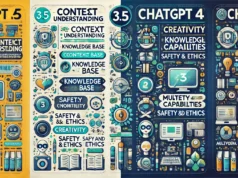How has GPT-3 revolutionized the field of language AI?
From GPT-3 to Infinity: Unleashing the Full Potential of Language AI

Language Artificial Intelligence (AI) has been advancing rapidly, revolutionizing how computers understand, generate, and interact with human language. One of the most remarkable breakthroughs in this field is GPT-3, or the third-generation Generative Pre-trained Transformer developed by OpenAI. With over 175 billion parameters, it is the largest and most powerful language model ever created.
GPT-3 can perform an astounding range of tasks, from generating creative writing and translating languages to answering questions and even writing code. Its ability to understand context, generate coherent text, and mimic human-like responses is truly impressive. But what lies beyond GPT-3? What is the future of language AI?
The potential of language AI seems limitless. The path forward involves addressing the challenges faced by GPT-3 and pushing the boundaries of natural language processing. Here are some key areas that researchers and developers are exploring:
1. Enhanced Contextual Understanding
GPT-3 has shown great potential in understanding context, but there is still room for improvement. Future language AI models aim to enhance contextual understanding by incorporating even deeper knowledge of the world, common sense reasoning, and better domain-specific comprehension.

“Language is intricate and multifaceted. The challenge lies in equipping language AI models with the ability to perceive nuanced meaning, cultural references, and hidden implications.”
2. Safer and Ethical AI
As language AI becomes more powerful, addressing ethical concerns and ensuring safety becomes paramount. Research efforts are focused on reducing biases, preventing the generation of harmful or malicious content, implementing robust safeguards, and promoting responsible use of language AI technologies.
3. Customization and Fine-Tuning
GPT-3 offers impressive performance out-of-the-box, but there is growing interest in allowing users to fine-tune and customize language models for specific tasks and domains. This flexibility empowers developers and users to tailor AI systems to their unique needs, leading to improved performance and specialized applications.

4. Multilingual and Cross-Lingual Understanding
Global connectivity demands language AI models that are proficient in multiple languages and capable of understanding complex cross-lingual nuances. Ongoing research aims to enable smooth translation, accurate multilingual comprehension, and seamless interaction across language barriers.
5. Continual Learning and Transfer Learning
Language AI would greatly benefit from the ability to continually learn and adapt to emerging trends, new domains, or user-specific requirements. Transfer learning techniques would allow models to retain previously acquired knowledge and build upon it, resulting in faster and more efficient training.

The road from GPT-3 to infinity is paved with exciting possibilities. As language AI evolves and unleashes its full potential, it will revolutionize industries, transform human-computer interactions, and usher in a new era of AI-assisted productivity, creativity, and understanding. Stay tuned for the next chapter in the awe-inspiring journey of Language AI!









